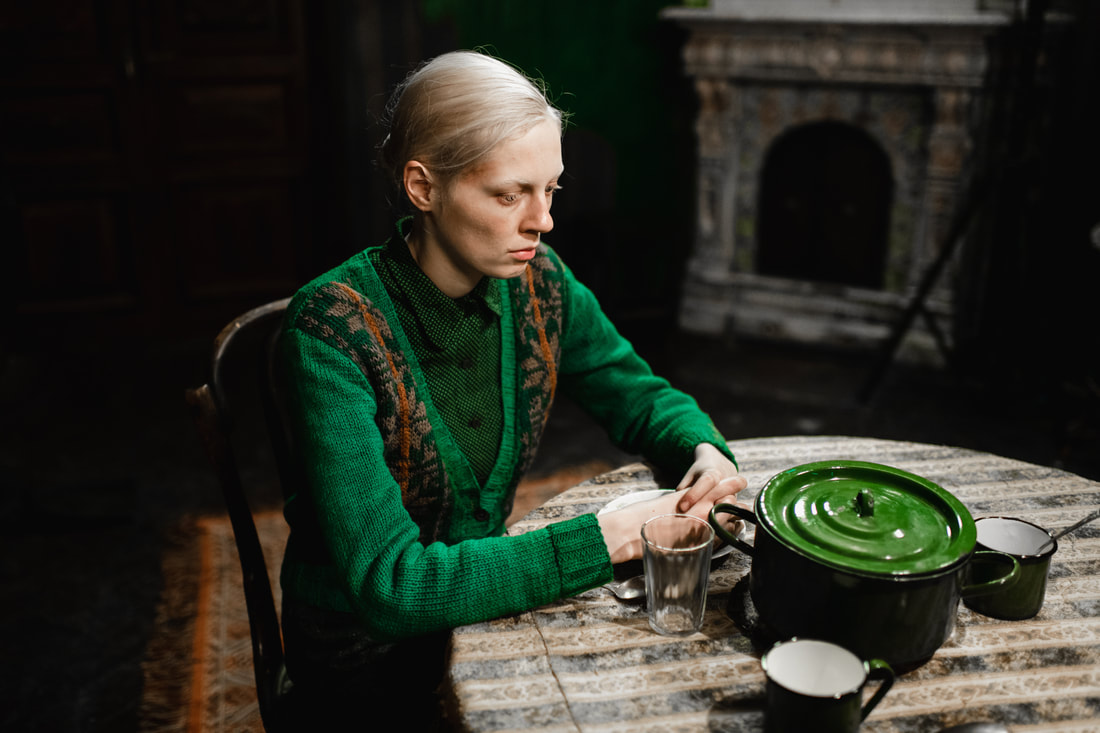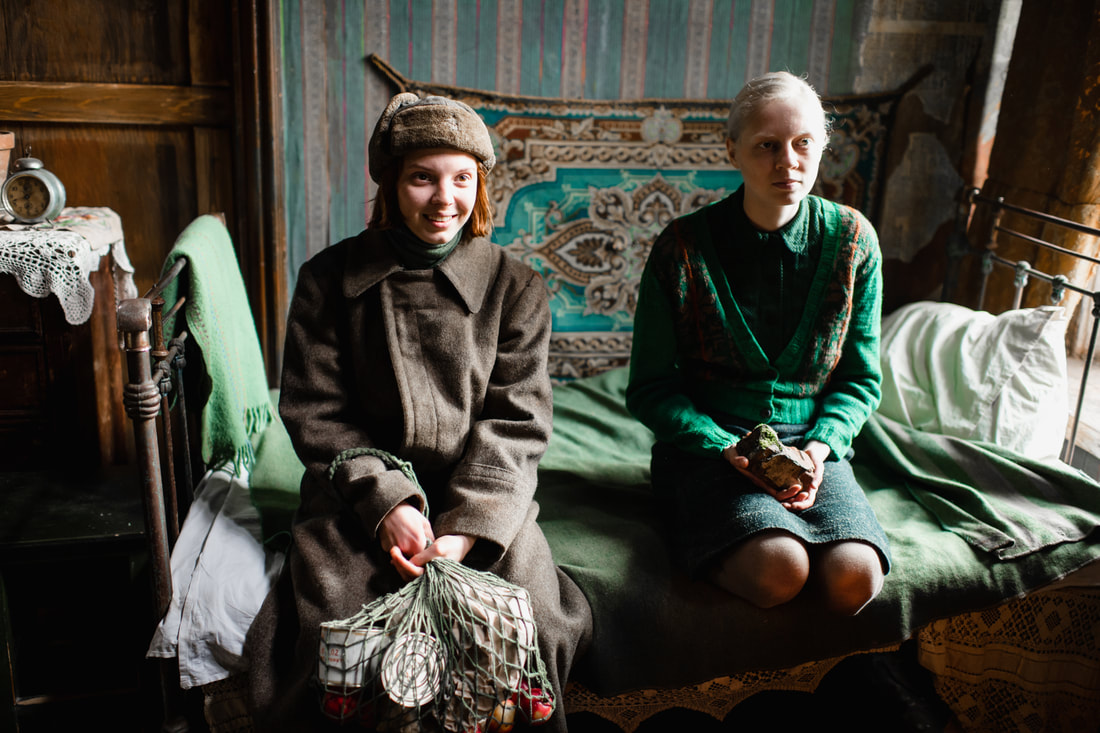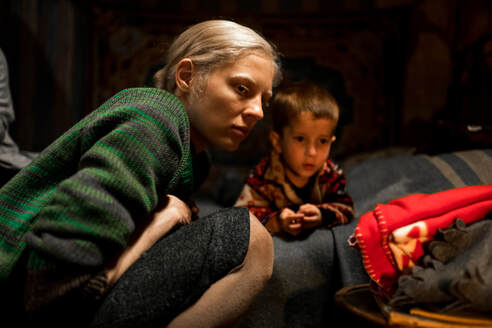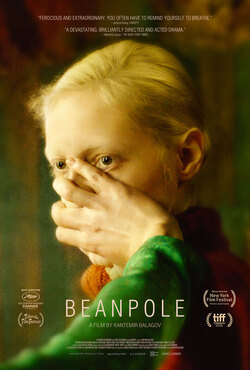|
Originally Published on Elements of Madness With just one other feature film under his belt (Closeness, 2017), Russian director Kantemir Balagov takes on a challenge with his second feature, Beanpole. The film packs a complex story of female friendship and desire that requires precise characterization and emotional nuance. Balagov certainly delivers with this exceptional film, demonstrating both his technical skill and his gift for storytelling. With Beanpole, Balagov uses the devastating setting of war-torn Leningrad to dissect the human need for intimacy in a manner that is both honest and biting. .Shortly after WWII in Leningrad, former anti-aircraft gunner Iya (Viktoria Miroshnichenko) works as a nurse in a hospital full of traumatized soldiers. Nicknamed “Beanpole” for her unusual height and stick-like frame, Iya also carries the burden of post-war trauma as she struggles with a “post-concussion syndrome” that causes her to freeze up and lose touch with her surroundings for several minutes at a time. When a horrific personal tragedy strikes, Iya retreats within herself and loses all hope. Soon, her army friend Masha (Vasilisa Perelygina) arrives in Leningrad, bringing a suitcase full of gifts and expecting a happy reunion. Despite the bond they formed while fighting alongside each other, the two women have vastly different ways of dealing with their grief and disillusion. Iya becomes ever more emotionally distant while Masha faces the world with a fierce determination to restore meaning to her life. As the two women desperately seek intimacy in a devastated world, their identities and their friendship break down to expose the deepest parts of human need and desire, both the beautiful and the disturbing. Beanpole is wildly successful in its ability to stimulate both emotions and intellect. The film doesn’t simply tell us what to think or feel, but continually introduces new thoughts and emotions that cause us to reframe our perspective on the story, even as it unfolds. Balagov allows the audience to digest the film’s many themes by creating a cohesive artistic world. Everything about Beanpole, from set and sound design to the actresses’ performances, works together to evoke a sickly, fragile, end-of-the-line kind of life. In both the hospital and Iya’s apartment, the film’s two main settings, visible decay and dim brown lighting cast a hopeless shadow over the entire story. Even when Masha tries to repaint their apartment a lively green, the paint drips down in goopy clumps that make the room even more sickening. All aspects of the film work together to create one unified world, providing a solid foundation on which Balagov tells a complicated story with many moving parts. One of those moving parts is the film’s mood. Beanpole feels almost bipolar, rapidly changing from joyful to disastrous. Yet, these shifts never feel rocky or out of place. The emotional pacing may be slightly uneven, with the most intense moment at the beginning of the film, followed by a slow-moving middle section. However, within each individual scene, the emotional transitions are effortless and natural. Balagov and co-writer Aleksandr Terekhov initiate these emotional shifts in the script by exploring everyday moments that have the potential to both heal and hurt, as when Masha models a beautiful new dress for her seamstress neighbor only to be reminded of her own poverty and grief. The cast follows through in these moments with effective and sympathetic performances. Miroshnichenko’s performance is especially heartbreaking as Iya’s happiest experiences are cut short by her post-concussion episodes. Her laughter morphs into guttural chokes, revealing the pain of Iya’s condition in a way that is believable and frightening. In the midst of this decaying world, cinematographer Kseniya Sereda creates beauty with striking images that burn themselves into your mind. Each frame is wonderfully composed and textured, like a baroque oil painting. As a film about suffering and poverty, Beanpole successfully avoids any kind of slum-tourism in its beauty. It doesn’t glorify the characters in their despair or exploit their suffering for the sake of a tragically beautiful and eye-grabbing story. Instead, Beanpole constantly reminds us that Iya and Masha are, like anyone else, deeply flawed. Their lives put them in situations that force them to make painful ethical decisions, and many times they make the selfish choice. Since the film switches between Iya and Masha’s perspectives, we get to see the women through different eyes at different points in the story, allowing us to recognize both the honorable and the flawed parts of these two characters. While we may see Iya as a beautiful hero in one moment, we then see her through Masha’s eyes and criticize Iya for her selfishness. While Beanpole is visually breathtaking, its story and characters point to the uglier parts of human reality A well-crafted film with captivating and dynamic characters, Beanpole is beautiful, disturbing, and painful. The film reframes our understanding of human need with characters who find themselves with absolutely nothing left. While it is difficult to watch, its beauty and realism have the potential to heal. With Beanpole, Balagov gives us a film that is both artistic and brave, a film that exposes ethical and moral questions that many are too afraid to ask.
0 Comments
Leave a Reply. |
"Our embodied spectator, possibly perverse in her fantasies and diverse in her experience, possesses agency...finally, she must now be held accountable for it." Categories
All
|






